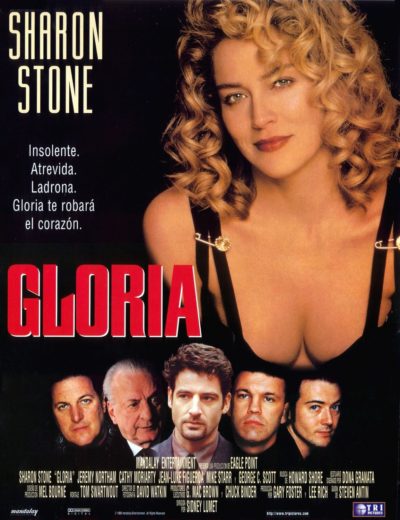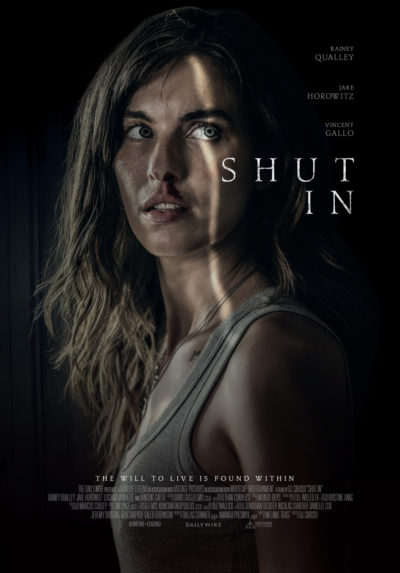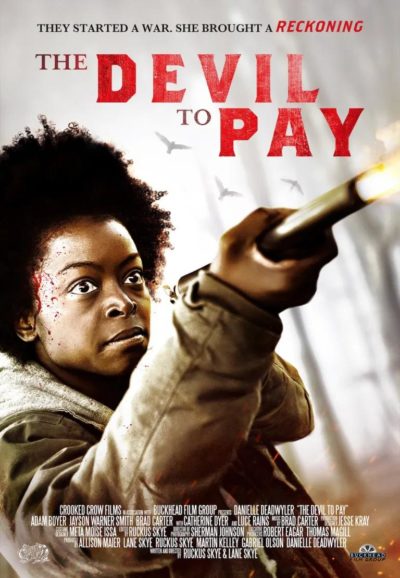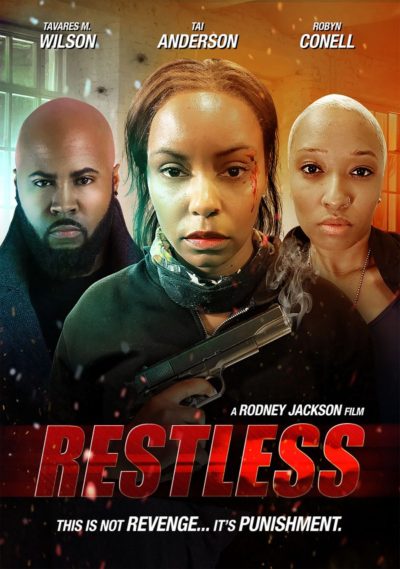★★★
“Teaching moment”
 Veronica (Beltrão) is a teacher in a Rio de Janeiro school. One day, nobody comes to pick up one of her pupils, Leandro (de Sá), so she accompanies him back to his house in the Rio slums known as favelas. Only, on arrival, she finds out his parents have been shot dead by gangsters. His father had been playing a dangerous game as an informant to the cops, and it had finally caught up with him. However, that morning, he had given his son a thumb drive containing a bombshell video, and his former employers are very keen to get it back. And, it turns out, so are the police, some of whom are in cahoots with the criminals. This leaves Veronica in a difficult position, with nobody she can be sure is trustworthy – including even her ex-husband, Paulo. a police officer himself.
Veronica (Beltrão) is a teacher in a Rio de Janeiro school. One day, nobody comes to pick up one of her pupils, Leandro (de Sá), so she accompanies him back to his house in the Rio slums known as favelas. Only, on arrival, she finds out his parents have been shot dead by gangsters. His father had been playing a dangerous game as an informant to the cops, and it had finally caught up with him. However, that morning, he had given his son a thumb drive containing a bombshell video, and his former employers are very keen to get it back. And, it turns out, so are the police, some of whom are in cahoots with the criminals. This leaves Veronica in a difficult position, with nobody she can be sure is trustworthy – including even her ex-husband, Paulo. a police officer himself.
In terms of action, the picture on the right is more the exception than the rule, if truth be told. Veronica spends more time avoiding those are seeking to harm her and/or Leandros; there’s considerably more running than shooting, shall we say. But she’s still an action heroine, brave enough to face enemies whom any normal person would think twice about going up against [or several more times, if they’ve seen the brutal reality of favela life and police corruption which is the awesome Elite Squad]. Even more impressive, it’s not for anyone related to her by blood, just a kid in her class. I dunno about your primary school teachers, I’m not sure many of mine would have put their lives on the line against a posse of well-armed gangsters for my sake. :)
Is it just me, or does this feel a bit like Gloria, with a woman having to protect a young boy from gangsters, over incriminating evidence? I did enjoy the setting though, with a side of Rio being a very long way from the more glossy aspects which the tourist board want you to see e.g. Mardi Gras and Christ the Redeemer. The city shown here seems considerably more alive, yet with that energy comes a perpetual undercurrent of menace, with violence present just below the surface. This begins with the opening scene, in which the gangsters hang out on a roof with an impressive (or disturbing, depending on your point of view!) amount of weaponry. It does a good job of establishing the threat here, and that then informs much of what follows.
The relationship between Veronica and Leandros is key to the movie, and it’s a bit of a mixed bag. At times, it seems very genuine, yet at others, Leandros has the usual issue with child actors, where their performance is obvious, instead of feeling natural. I will confess the climax also felt a little disappointing, with the heroine having to rely on the actions of others. The previous 90 minutes had shown her as being self-reliant and full of initiative, and I’d rather have seen this continue through the end. So, some way short of perfect, yet there are positives as well, and this still felt like a worthwhile experience.
Dir: Maurício Farias
Star: Andrea Beltrão, Matheus de Sá, Marco Ricca, Giulio Lopes





 The main theme of this book appears to be, “How far will a mother go, to protect her daughter?” Based on what we read here, the answer to that question appears to be, “Very, very far.” The heroine is Sherica Daniels, who initially appears to have somewhat lucked out and escaped a nasty and abusive relationship. Her husband, drug addict Roy, has just died following a pair of botched armed robberies. That should leave her and teenage daughter Ashlynn to get on with their lives. Not so fast. For it’s only a short while before Roy’s drug dealer, Tokie, shows up. He’s demanding Sherica pays her husband’s debt – and more, because he believes she knows where the unrecovered loot from Roy’s robberies was hidden. When she fails to convince Tokie otherwise, he abducts Ashlynn.
The main theme of this book appears to be, “How far will a mother go, to protect her daughter?” Based on what we read here, the answer to that question appears to be, “Very, very far.” The heroine is Sherica Daniels, who initially appears to have somewhat lucked out and escaped a nasty and abusive relationship. Her husband, drug addict Roy, has just died following a pair of botched armed robberies. That should leave her and teenage daughter Ashlynn to get on with their lives. Not so fast. For it’s only a short while before Roy’s drug dealer, Tokie, shows up. He’s demanding Sherica pays her husband’s debt – and more, because he believes she knows where the unrecovered loot from Roy’s robberies was hidden. When she fails to convince Tokie otherwise, he abducts Ashlynn. Margo Crane (DelaCerna) has been brought up by her native American father, since her mother walked out on them several years ago. Under his guidance, they have become self-sufficient, and Margo has become a crack shot. However, her creepy uncle ends up having sex with the teenager, an incident for which she gets blamed, ruining her life. She resolves to apply her shooting skills on him, only for the resulting incident to become a tragedy. Margo strikes out on her own up the Stark river, in search of her absent mother. Doing so, she meets a variety of people, then has to try and reconnect with a woman who now has her own life, one not necessarily helped by the unexpected arrival of a teenager.
Margo Crane (DelaCerna) has been brought up by her native American father, since her mother walked out on them several years ago. Under his guidance, they have become self-sufficient, and Margo has become a crack shot. However, her creepy uncle ends up having sex with the teenager, an incident for which she gets blamed, ruining her life. She resolves to apply her shooting skills on him, only for the resulting incident to become a tragedy. Margo strikes out on her own up the Stark river, in search of her absent mother. Doing so, she meets a variety of people, then has to try and reconnect with a woman who now has her own life, one not necessarily helped by the unexpected arrival of a teenager. Yeah, I’ll confess to having Laura Branigan’s eighties hit running through my head on repeat almost the entire movie, even if its lyrics can only be tangentially tied to it. What also struck me is how strong of an influence this was on Luc Besson’s Leon, especially at the beginning. I mean: a criminal gang takes out an entire family in a New York tenement, except for one child, as punishment for the father having tried to steal from them. That survivor takes refuge with a very reluctant neighbour with mob ties, who then has to protect the child as they move about the city. There’s even a scene where one of the gang fires his gun at a nosy resident.
Yeah, I’ll confess to having Laura Branigan’s eighties hit running through my head on repeat almost the entire movie, even if its lyrics can only be tangentially tied to it. What also struck me is how strong of an influence this was on Luc Besson’s Leon, especially at the beginning. I mean: a criminal gang takes out an entire family in a New York tenement, except for one child, as punishment for the father having tried to steal from them. That survivor takes refuge with a very reluctant neighbour with mob ties, who then has to protect the child as they move about the city. There’s even a scene where one of the gang fires his gun at a nosy resident. Nineteen years after the original, four-time Oscar nominated director Lumet opted to remake Cassavetes’s movie. Though by some accounts, it was more a case of him wanting to work, rather than being particularly attracted to the project. If the results are anything to go by, he should have stayed at home. For the film was a bomb, and leading lady Stone received a Razzie nomination for her efforts. I wouldn’t have said she was that bad, though she’s clearly not at the same level as Gina Rowlands in the original. It does also address some of what I felt were its’ predecessor’s weaknesses. However, it tones down the central character, and this helps lead to what you’d be hard-pressed to argue is other than an inferior product overall.
Nineteen years after the original, four-time Oscar nominated director Lumet opted to remake Cassavetes’s movie. Though by some accounts, it was more a case of him wanting to work, rather than being particularly attracted to the project. If the results are anything to go by, he should have stayed at home. For the film was a bomb, and leading lady Stone received a Razzie nomination for her efforts. I wouldn’t have said she was that bad, though she’s clearly not at the same level as Gina Rowlands in the original. It does also address some of what I felt were its’ predecessor’s weaknesses. However, it tones down the central character, and this helps lead to what you’d be hard-pressed to argue is other than an inferior product overall. I guess, at its heart, this is the story of two mothers. There’s Jo (Campbell-Hughes), an anaesthetist who has been struck off the medical register, for reasons that are left murky. She’s now practicing her healing arts on the underground market, from patching up dubious stabbing victims, to carrying out unlicensed abortions. Jo lost her daughter to meningitis, and has split from her husband. Then there’s Bernadette (Brady), a wealthy but no less murky character. Her daughter is dying, and in desperate need of a transplant. To that end, Bernadette has kidnapped a young woman, Aine (McNulty), with the intention of using her as an unwilling organ donor, and needs Jo’s help for the operation. But when Aine – who would be about the age of Jo’s daughter had she lived – escapes and hides in the back of the physician’s car, Jo is left with a series of difficult decisions.
I guess, at its heart, this is the story of two mothers. There’s Jo (Campbell-Hughes), an anaesthetist who has been struck off the medical register, for reasons that are left murky. She’s now practicing her healing arts on the underground market, from patching up dubious stabbing victims, to carrying out unlicensed abortions. Jo lost her daughter to meningitis, and has split from her husband. Then there’s Bernadette (Brady), a wealthy but no less murky character. Her daughter is dying, and in desperate need of a transplant. To that end, Bernadette has kidnapped a young woman, Aine (McNulty), with the intention of using her as an unwilling organ donor, and needs Jo’s help for the operation. But when Aine – who would be about the age of Jo’s daughter had she lived – escapes and hides in the back of the physician’s car, Jo is left with a series of difficult decisions. After
After 


 This feels like a Canadian version of
This feels like a Canadian version of